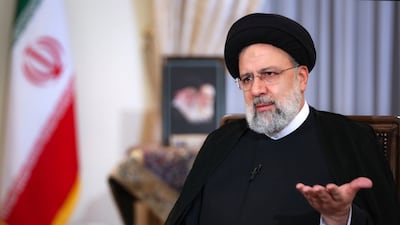Live updates: follow the latest news on Russia-Ukraine
Iran is exporting twice as much oil as it did in August last year, despite US sanctions, President Ebrahim Raisi has said.
“Oil sales have doubled,” Mr Raisi, who took office in August, said during a live interview on Monday on state-run TV.
“We are not worried about oil sales.”
It comes as international markets are seeking alternatives to Russian crude, after Russia's invasion of Ukraine and ensuing western sanctions.
Iran’s crude, with a similar composition to Russia’s grade, can compete in the global oil market.
As a result of the war and supply concerns, oil prices have surged to multi-year highs. International benchmark Brent crude nearly touched $140 in March, increasing the challenge of enforcing sanctions. Brent was trading above $105 a barrel on Monday, AP reported.
The oil windfall has been a boon to Iran’s public finances. Iran says it is now selling billions of dollars more crude than previously despite the American sanctions.
The Central Bank of Iran issued statistics at the start of February showing it made $18.6 billion in oil sales in the first half of the Persian calendar year, compared to $8.5 billion during the same period last year, said the state-run IRNA newspaper. Much of that oil is believed to be heading to China. Venezuela has also received Iranian tankers at its ports.
Iran’s Oil Minister Javad Owji told local media in April that the country’s oil exports had surged by 40 per cent since Mr Raisi took office.
Sweeping sanctions
Four years ago, then-president Donald Trump withdrew the US from Iran’s 2015 nuclear deal with world powers and imposed sweeping sanctions on Tehran, including against its vital oil sector.
Crude exports plummeted and international oil companies scrapped deals with Iran, weakening its economy.
The nuclear deal had imposed limits on Tehran's enrichment of uranium in exchange for the lifting of economic sanctions — including those aimed at its oil sales.
Negotiations in Vienna on restoring the tattered deal nearly reached completion in early March, but talks stalled. Negotiators have yet to reconvene in the Austrian capital.
The EU co-ordinator for the talks is expected in Tehran later this week in a last-ditch effort to break the deadlock.
Iran has made the sanctions-hit oil industry a core issue in the negotiations with the aim of reaching the point where Iranian oil is sold easily and without any barriers.

